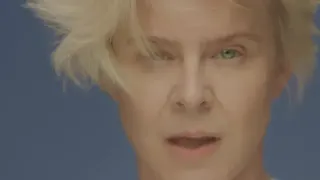
7 hours ago
Margaret Atwood Reflects on Literature, Feminism and Luck
Hillel Italie READ TIME: 6 MIN.
The cover of Margaret Atwood's memoir shows a close-up of the author holding up a finger to her mouth, a mischievous look in her eyes, as if to suggest a riddle or two: Is this a book in which secrets will be revealed, or perhaps one in which secrets are kept?
Yes, and yes.
“Book of Lives: A Memoir of Sorts” is a 600-page look at the personal and creative life of one of the world's most acclaimed, influential and provocative authors. The 85-year-old at times has been called a prophet — a reluctant one — for the repressive society she conjured in the dystopian classic “The Handmaid's Tale.” And she has lived many lives, as the new book's title suggests, probing her journey from the Canadian wilderness to the international stage.
While Atwood has discussed everything from childhood to parenthood in essays and interviews, she has otherwise been more at home with understatement than with confession. But after years of resisting requests from her publishers to tell her story, she came to like the idea of a memoir, of sorts, about “what you remember, rather than a biography, which is a lot of things you don’t remember or would rather not remember,” she told The Associated Press.
Atwood writes in the introduction that she wasn't immune to the “lurid phosphorescent glow” of gossip and score settling, but didn't want to limit herself to “squalid moral bookkeeping.” Her book is, in part, a story of how a writer writes — and gets inspired. “The Handmaid's Tale” began with a concept Atwood once thought too “weird”: What if the United States became a totalitarian theocracy? “Alias Grace” was based on a pair of murders in 19th century Canada. “The Robber Bride” is her take on a Brothers Grimm fairy tale.
“Book of Lives” has its moments of frustration, grief and betrayal: One of her most vivid childhood memories, a source for her novel “Cat's Eye,” was of being tricked by a circle of alleged friends into letting herself be buried in a hole, left in the snow and other ordeals meant to “improve” her. But, as Atwood acknowledges, her memoir is also a story of good fortune. She is a prize-winning author who has lived off her work without having to compromise. She is the child of parents she loved and admired and was the longtime companion of the late author-adventurer Graeme Gibson, a bond sealed in part by a canoe trip to Canada's Georgian Bay and continued through excursions everywhere from Trinidad to Australia.
Atwood says that mortality is another reason she felt ready to write “Book of Lives.” Her parents are long gone, as are any number of onetime friends and rivals. Asked if she would have published the book were Gibson, who died in 2019, still alive, she says no. She adds that she didn't struggle to return to their years together.
“I quite enjoyed writing those parts,” she says. “I didn’t like the part where he dies — that wasn’t fun. But it's real life. And in real life, people die.”
During a recent interview, Atwood also spoke of luck, feminism, the reason for imagining the worst and why she didn't rebel against her parents. This conversation has been edited for brevity and clarity.
AP: I came out of this book thinking you've had a good life.
ATWOOD: On the whole, yes. I think I was part of a quite lucky generation in many ways. And on the whole, nothing terrible happened to me. Hurray for me (laughs). And I lived in a place where, you know, it wasn’t war-torn. People were not dropping bombs on it. They were not, you know, massacring everybody. And that cannot be said of other parts of the world.
AP: Did the relative stability of your life make it easier for you to explore some of the dark themes in “The Handmaid's Tale” and elsewhere?
ATWOOD: I am part of the World War II generation. And it may seem odd to say that we were a lucky demographic. But remember, we were children during that time, so we weren’t being sent to the war. We knew people, we had relatives, but we ourselves were too young to actually be in it. But it made me very interested in not only the war, but dictatorships in general.
AP: There are so many stories of writers rebelling against their parents, the need to break from them. I don’t sense that's true for you.
ATWOOD: I was a sneaky little teenager. But no, I didn’t have a sense of rebelling against my parents. But I did have a sense of not always doing what they would have preferred. And, their preferences were reasonable. I mean, they didn’t think that being a writer was a good choice in 1957. Only 10% of writers ever actually make their living in it, unless they’re employed by somebody. So my mother said, “If you’re going to be a writer, you better learn to spell.” And I said, “Others will do that for me.”
AP: You write about the girls who tricked you when you were 9. Something that strikes me about that story is how hard it is for me, and probably for a lot of people who know you and your work, to imagine you as naive and easily fooled.
ATWOOD: Well, it’s not that I hadn’t known any children, but they’d mostly been boys. And boys are, excuse me, easier to figure out. And sort of simple. But girls are quite complex. Boys have a hierarchy which is predicated on actual things. Who's best in baseball. Who’s the best at video games? Things like that you can measure. Whereas girls, somebody can be queen one day and deposed behind her back the next. And she doesn’t know why.
AP: You've talked about this a lot, saying please don't turn women into saints. And don't just say the patriarchy made them do it.
ATWOOD: You can live within the system and still make moral choices, as many have done.
AP: Especially because of “The Handmaid’s Tale,” people say, “There’s Margaret Atwood, the great feminist.”
ATWOOD: So we have to be a bit careful with that word, right? Because I do think words are important. And that word has been overused and applied to all sorts of things, like “Communist” and “Christian,” just for instance. So there are at least 75 different kinds of feminism and you can find them, I believe, on Wikipedia.
AP: Which type of feminist are you?
ATWOOD: The kind that’s interested in equality under the law. So that means I’m interested in organizations like Equality Now, because that’s what they work on. So I was never interested, during second-wave feminism, let’s say 1972, in the part that said you had to wear overalls and work boots. That did not appeal to me. I didn’t mind wearing overalls and work boots, but I didn’t feel I had to wear them all the time.
AP: Did you imagine writing a book like “Handmaid's Tale” might make it less likely that such a scenario in the book would occur?
ATWOOD: Well, all dystopias are warnings. So they’re all saying there’s a big hole in the road up ahead and you better be careful you don’t fall into it. Whereas if I wanted you to fall into the hole, I wouldn’t say anything about it. “Yeah. It’s a smooth road ahead. It’ll be great.”
AP: Your inspirations come from so many different sources. It seems there’s almost no area of knowledge that's not interesting to you, whether it’s science or how-to manuals or military history. Is there any field of knowledge that just doesn't interest you?
ATWOOD: Trigonometry.
AP: What's wrong with trigonometry?
ATWOOD: Let me count the ways. I never studied it, and it seems impenetrable to me. I do have a nephew who’s a physicist, specializing in the nature of the universe. And our conversation is fairly limited.
AP: Do you view your life differently now, having written this memoir? Did it make you say, “My life looks a little bit different to me now”?
ATWOOD: What a funny question.
AP: There are writers who talk about how writing helps them learn what they think.
ATWOOD: I think that comes earlier. I think by the time you’re 85, you pretty much know how you think. And if you don’t know, maybe you should go take a cognitive test (laughs).
AP: Are there any of your books that you look at in particular and think “That was a real peak for me.”
ATWOOD: I have never answered that question.
AP: Why?
ATWOOD: The others will hear about it. They’ll say, “I spent all this time with you. I gave you my all and let you edit me six times and you’re not even grateful.”
AP: We've talked about how on balance you feel you've had a good life. Is gratitude a word you would apply to yourself?
ATWOOD: For sure, “lucky” is a word I would apply.
AP: But you didn't want to call your book “Lucky.”
ATWOOD: That sounds like somebody's dog.






